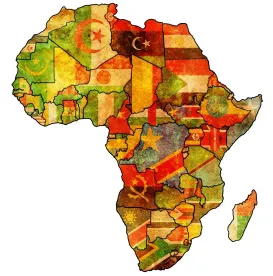Over the past two decades, Sub-Saharan Africa has caught the attention of an increasing number of investors who are looking for new and promising opportunities. While growth has slowed in some of the region’s oil exporting countries, the “Africa Rising” narrative continues due to the region’s youthful population of 1 billion people (70 percent are under 30), rapid urbanization, and ongoing improvements in democratic governance, economic management, and peace and security. Sub-Saharan Africa remains ripe with potential and opportunity but there are important factors to consider when seeking to do business in the region.
Market Boundaries Don’t Necessarily Map Onto Country Borders
When looking to define the market, it is important to remember that not only is Africa a large and heterogeneous continent but that market boundaries do not necessarily map onto country boundaries. Moreover, there are approximately 50 cities in Africa with one million or more people. As a consequence, one can define the market in terms of regional blocs, or countries (especially if the country is particularly populous, like Ethiopia or Nigeria), urban corridors, or sub-markets within or across countries. In certain cases, trading communities that exist on both sides of a border, or along a particular trading route, are economically similar and might be considered when defining the geography of the market. Similarly, it can make sense to look at an entire sub-region as one market; for example, the East African Community is trying to encourage precisely this outlook as it works to harmonize tariffs and standards across its five members.
Strategic Relationships Shape Business Opportunities
Strong local relationships are critical to a business’s successful integration and growth on the continent. Demonstrating a sincere, long-standing commitment and having a continuous on-the-ground presence will be key to developing good partnerships with competent local partners. Given that an increasing number of countries are passing or strengthening local content laws and policies, investors should anticipate working with local partners. However, due diligence into potential partners is critical. Without an understanding of the local terrain and given the persistence of small, well-connected elites, companies risk engaging local partners who are politically exposed persons, which could trigger liability under domestic and foreign anti-corruption laws.
Finally, entering into partnerships with other stakeholders—such as local companies along the supply chain, development finance institutions, and international and local not-for-profits—can lead to a strategic division of resources to overcome market challenges. These strategic relationships can also generate a positive identity in the market for a new investor as well as invaluable market intelligence.
Government Involvement in Private Sector is a Fact of Life
African governments tend to be closely involved in the private sector, both officially and unofficially. Accordingly, it is key to develop amicable working relationships with the government at all levels and to align commercial objectives with the government’s development agenda. Virtually every country has a five or ten-year development strategy and companies should be familiar with it, especially in their sector, be it health, finance, manufacturing, etc.
This type of commercial engagement strategy will enable international companies to respond appropriately if governments’ priorities or composition unexpectedly and suddenly shift in response to internal and external pressures. Companies that are nimble, flexible and not overly reliant toward any given politician, party, or policy reduces the risk that political change will upend the business model.
Mind Infrastructure Gap
The dearth of “hard” infrastructure—such as roads, power, telecommunications—across Africa is well known and must be accounted for in any planned business ventures. But businesses also must find ways to address deficiencies in the “soft” infrastructure, such as the existence and enforcement of legal and regulatory frameworks, quality and safety standards, and functional educational and health systems. Companies need to develop short-, medium- and long-term plans for how to bridge both the hard and soft infrastructure gaps. Additionally, companies should consider risk insurance, options for dispute resolution, and tapping into private networks that serve public functions, such as local trade associations, among other methods of working around these structural deficits.
For many investors, the shortage of skilled local talent is the most challenging aspect of the soft infrastructure gap. Uneven local educational inputs are the primary obstacle. Expats, who typically require salary premiums and visa requirements that can be challenging, are only a short-term solution. Businesses should consider investing early in on-the-job training to groom local talent, and may wish to enter into strategic partnerships with local NGOs and universities to create and nurture a talent pipeline.
Market Data Deficit Makes it Harder to do Business-as-Usual
For an investor, the data deficit in Africa makes decision-making harder. When it comes to market and research analysis, conducting diligence on prospective local partners, or assessing customers’ credit history, investors need to be aware that traditional means of data gathering and analysis are often unavailable, which requires alternative approaches. While the data gap is narrowing thanks to the increasing use of mobile communications to collect information, at this point, on-the-ground presence remains the best way to mitigate this problem.
Finding Local Counsel
There are very skilled lawyers across jurisdictions in Africa that can provide useful on-the-ground expertise. If possible, it is useful to interview several firms to determine the best fit and to identify potential conflicts of interest, which may be more of an issue in countries with limited numbers of qualified firms. In addition, there are a growing number of legal networks across the continent that can be useful to tap into as well.





 />i
/>i

